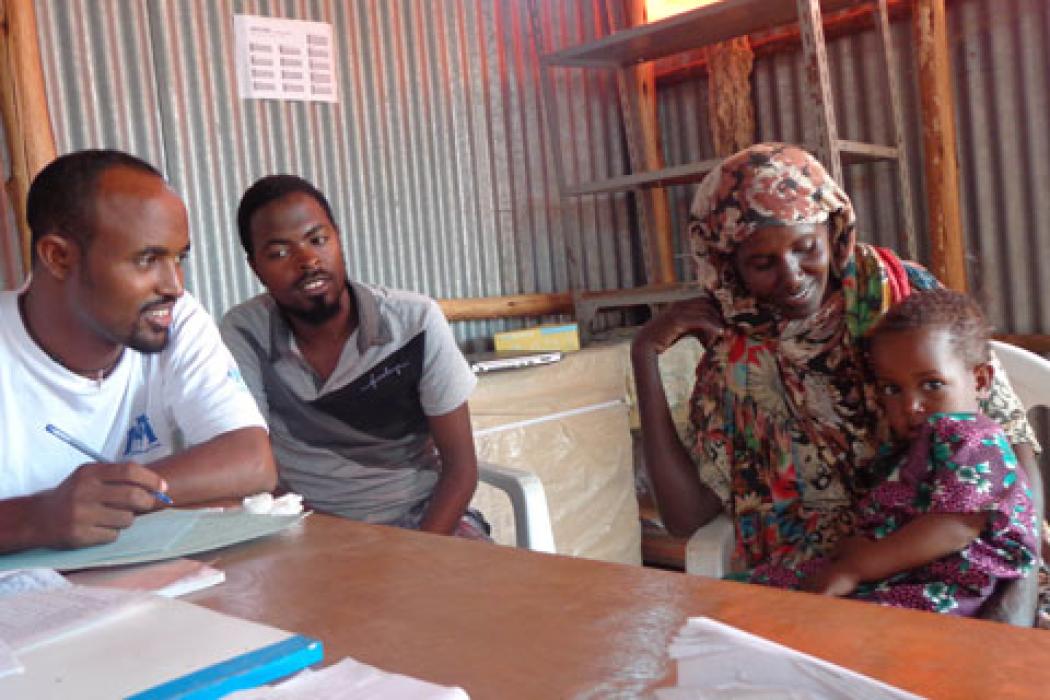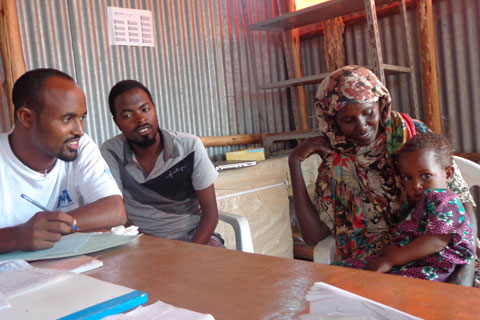Tackling the global burden of mental health: an impossible task without frontline health workers

By Inka Weissbecker, Global Mental Health and Psychosocial Advisor, International Medical Corps
Two years ago, Majeed*, a Somali refugee living in the Ethiopian refugee camp in which International Medical Corps works, began acting inexplicably different. Majeed would become startled for no apparent reason, act suspicious of his parents, and shout and talk incoherently. He also ran away from the refugee camp and, when his family and neighbors found him, became violent. Majeed’s father ended up putting chains on him to keep him from running away or harming himself. But then International Medical Corps reached Majeed with mental health services.
Majeed suffers from chronic psychosis. Most people like Majeed do not have access to mental health care to manage their symptoms, which prevents them from living and fully functioning in their communities. There is a vast shortage of mental health professionals and services in low- and middle-income countries. According to the World Health Organization (WHO), low-income countries have 0.05 psychiatrists and 0.16 psychiatric nurses per 100,000 people— 200 times less than in the rates in high-income countries (WHO, 2005). An estimated 76%–85% of people with mental health problems in less-developed countries received no treatment in the last year (WHO, 2012).
In humanitarian emergencies, the percentage of people with a severe mental disorder, such as psychotic disorders, increases by 1%, while mild or moderate mental disorders such as post-traumatic stress disorder or depression might increase by 5%–10% (WHO, 2005). People with mental disorders are especially vulnerable to stigma, discrimination, violence and abuse. They and their families often seek traditional healers and religious leaders for help first and are not often aware that other effective treatments exist.
 With funding from the U.S. Bureau of Population, Refugees and Migration (BPRM), International Medical Corps is implementing a project to integrate treatment for WHO and national priority mental health and neurological conditions in Ethiopian Administration for Refugee and Returnee Affairs health clinics in the Dolo Ado refugee complex in Ethiopia. Photo courtesy International Medical Corps
With funding from the U.S. Bureau of Population, Refugees and Migration (BPRM), International Medical Corps is implementing a project to integrate treatment for WHO and national priority mental health and neurological conditions in Ethiopian Administration for Refugee and Returnee Affairs health clinics in the Dolo Ado refugee complex in Ethiopia. Photo courtesy International Medical Corps
Mental disorders account for more of the world’s disease burden in terms of disability-adjusted life years than HIV/AIDS, tuberculosis and malaria combined (WHO, 2008). Mental health problems cause significant suffering, decrease people’s ability to complete daily tasks, engage in livelihood activities and employment, take part in educational opportunities and build supportive relationships with others.
In order to close the gap between the number of people who need mental health care and those who receive it, we cannot rely only on mental health specialist. Therefore, WHO recommends the integration of mental health into general health care. The WHO published the Mental Health Gap Intervention Guide in 2010 to support the training of general health care providers in identifying and managing priority mental health and neurological conditions that are most prevalent or cause a high degree of impairment—such as depression, psychotic disorders, substance use, epilepsy, unexplained somatic complaints and developmental disorders in children. Several low- and middle-income countries have already made mental health and primary health care integration part of their national policies and plans, often with WHO support and/or international NGOs as implementing partners. Those countries include Brazil, Nepal, Ethiopia, Afghanistan, South Sudan, Somalia, Libya, the occupied Palestinian territories and Jordan, among others.
Frontline health workers play a critical role in scaling up access to mental health care. Community health workers can identify people in need and facilitate access to health facilities, as well as help with follow-up care. Research demonstrates that community health workers can be trained to treat some common mental disorders, such as depression (Rahman et al, 2008). An increased number of trained doctors and mid-level staff are needed to address mental health conditions at the health facility level, including pharmacological treatment and management of unexplained somatic complaints, which are common in primary health care settings and can be stress-related.
Today, Majeed is recovering because mental health services are being integrated into general clinic health facilities in the Somali camp where he lives. A few months ago, Majeed’s father proudly held up the chains he had previously used, telling other community members that mental health problems can be treated. Scaling up access to appropriate care for people with severe or chronic mental illness and common mental disorders like depression is possible. Frontline Health Workers play the most critical role in making those efforts succeed.
*Names and identifying information changed to protect privacy
References
Rahman A, Mali A, Roberts C, et al (2008): Cognitive behavior therapy–based intervention by community health workers for mothers with depression and their infants in rural Pakistan: a cluster-randomized controlled trial. Lancet 372:902– 909, 2008.
World Health Organization (2004). The global burden of disease: 2004 update. Available at: http://www.who.int/healthinfo/global_burden_disease/en/index.html
World Health Organization. (2008). Scaling up care for mental, neurological and substance use disorders. Mental Health Gap Action Program. Geneva, Switzerland.
World Health Organization & United Nations High Commissioner for Refugees (2012). Assessing Mental Health and Psychosocial Needs and Resources: Toolkit for Major Humanitarian Settings. Geneva: WHO, 2012.
